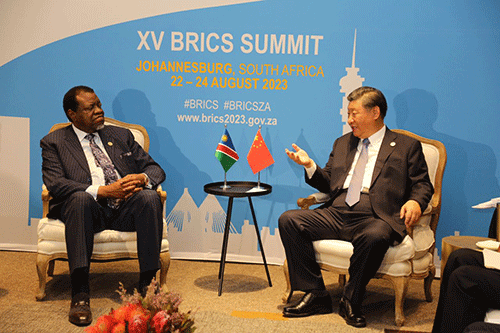President Hage Geingob yesterday bemoaned the historical dominance of the Bretton Woods financial institutions, whose modus operandi he said is built on loan conditionalities and political prescriptions which has, at times, bordered on disregard for national sovereignty.
This way of doing things, Geingob said, has increased an appetite among many nations for a counterweight such as BRICS.
“BRICS offers that alternative option by assuring like-minded countries of an opportunity to participate and do business in an international economic and financial system, which is based on universally- recognised international principles and values such as non-interference in domestic affairs, mutual respect and win-win cooperation,” the President said at the just-ended BRICS-Africa Outreach and BRICS Plus Dialogue.
Geingob was one of the invited leaders from nine African countries to partake in the BRICS-Africa Outreach and the BRICS Plus Dialogues in his capacity as the outgoing chairperson of the Southern African Development Community (SADC) Organ Troika.
BRICS, consisting of Brazil, Russia, India, China and South Africa, held its 15th annual three-day summit in Johannesburg this week.
Some 50 heads of state and governments were in attendance.
Going forward, Geingob urged dialogue to elaborate on some of the crucial modalities of how an expanded BRICS Plus will function in the best interest of all its members.
“We believe that an important global grouping of nations such as BRICS, which is born from the collective desire of the countries from the South to make the international order more just and equitable, and favourable to peace and development for all, will break down the barriers of division, confrontation and conflicts,” he noted.
Open for business
On the occasion of a BRICS summit with Chinese and African leaders, Geingob emphasised that Namibia is open for business. In the same vein, he invited investors to assist Namibia in the development of its green energy infrastructure to consolidate regional energy value chains and off-take agreements.
In the pursuit of Africa’s industrialisation and prosperity, he said there is scope for more work to be done in new areas of cooperation such as green hydrogen, oil and gas.
“Namibia is at an advanced stage in the development of its green hydrogen industry and the supply of critical raw minerals, including lithium, which is needed for the green energy transition as part of our fight against climate change,” said the President.
As a country that triumphed over colonialism and imperialism, Geingob said he was pleased with the giant steps made in the areas of political and economic cooperation under the China-Namibia Comprehensive Cooperation Strategic Partnership.
Building the bloc
While announcing the outcomes of the historic summit, South African president Cyril Ramaphosa yesterday invited Argentina, Egypt, Ethiopia, Iran, Saudi Arabia and the United Arab Emirates to become full members of BRICS. These memberships are to take effect from 1 January 2024.
In his statement, Ramaphosa observed that BRICS countries reached an agreement on the guiding principles, standards, criteria and procedures of the BRICS expansion process, which has been under discussion for quite a while.
“We have consensus on the first phase of this expansion process, and further phases will follow. We value the interest of other countries in building a partnership with BRICS. We have tasked our foreign ministers to further develop the BRICS partner country model and a list of prospective partner countries and report by the next summit,” Ramaphosa added.
Furthermore, the South African president noted that BRICS encouraged multilateral financial institutions and international organisations to play a constructive role in building a global consensus on economic policies.
According to him, there is global momentum for the use of local currencies, alternative financial arrangements, and alternative payment systems.
Thus, BRICS is ready to explore opportunities for improving the stability, reliability and fairness of the global financial architecture.
Summit participants agreed to task BRICS finance ministers and/or central bank governors to consider the issuance of local currencies, payment instruments and platforms, and report back to the BRICS leaders for the next annual summit. –mndjavera@nepc.com.na
Photo: BRICS
Caption:



